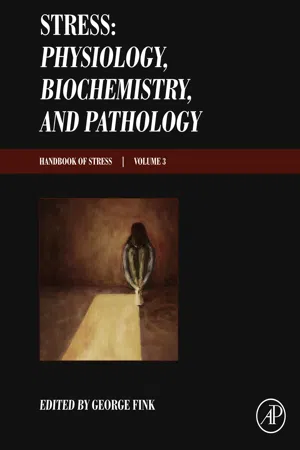
Stress: Physiology, Biochemistry, and Pathology
Handbook of Stress Series, Volume 3
- 420 pages
- English
- ePUB (mobile friendly)
- Available on iOS & Android
About This Book
Stress impacts the daily lives of humans and all species on Earth. Physiology, Biochemistry, and Pathology, the third volume of the Handbook of Stress series, covers stress-related or induced physiology, biochemistry, and pathology. Integrated closely with new behavioral findings and relevance to human conditions, the concepts and data in this volume offer readers cutting-edge information on the physiology of stress.A sequel to Elsevier's Encyclopedia of Stress (2000 and 2007), this Handbook of Stress series covers the many significant advances made since then and comprises self-contained volumes that each focus on a specific area within the field of stress. Targeted at scientific and clinical researchers in neuroendocrinology, neuroscience, biomedicine, endocrinology, psychology, psychiatry, the social sciences, and stress and its management in the workplace, this volume and series are ideal for graduate students, post-doctoral fellows, and faculty interested in stress and its consequences.
- Chapters offer impressive scope, with topics addressing stress-related or induced physiology, biochemistry, and pathology
- Articles carefully selected by eminent stress researchers and prepared by contributors representing outstanding scholarship in the field, with each chapter fully vetted for reliable expert knowledge
- Richly illustrated with explanatory figures and tables
- Each chapter has a boxed "Key points" call out section
- The volume is fully indexed
- All chapters are electronically available via ScienceDirect
- Affordably priced, self-contained volume for readers specifically interested in the physiology, biochemistry and pathology of stress, avoiding the need to purchase the whole Handbook series
Frequently asked questions
Information
Table of contents
- Cover image
- Title page
- Table of Contents
- Copyright
- Contributors
- Preface
- Chapter 1. Arousal
- Chapter 2. Resilience of the Brain and Body
- Chapter 3. Cerebral Metabolism, Brain Imaging and the Stress Response
- Chapter 4. Stress-Hyporesponsive Period
- Chapter 5. Hippocampus and Hippocampal Neurons
- Chapter 6. Memory and Stress
- Chapter 7. Adult Neurogenesis and Stress
- Chapter 8. Stress, Corticosterone, and Hippocampal Plasticity
- Chapter 9. Dopamine and Stress
- Chapter 10. Serotonin in Stress
- Chapter 11. Excitotoxicity
- Chapter 12. Chaperone Proteins and Chaperonopathies
- Chapter 13. Oxidative Stress: Eustress and Distress in Redox Homeostasis
- Chapter 14. Gender and Stress
- Chapter 15. Atrial Natriuretic Peptide, the Hypothalamic–Pituitary–Adrenal Axis, and Panic Attacks
- Chapter 16. Stress, Reward, and Cognition in the Obese Brain
- Chapter 17. The Innate Alarm System: A Translational Approach
- Chapter 18. Stress-Induced Anovulation
- Chapter 19. Multidrug Resistance P-Glycoprotein (P-gb), Glucocorticoids, and the Stress Response
- Chapter 20. Stress and Glucocorticoids as Experience-Dependent Modulators of Huntington's Disease
- Chapter 21. PACAP: Regulator of the Stress Response
- Chapter 22. Glucose Transport
- Chapter 23. Links Between Glucocorticoid Responsiveness and Obesity: Involvement of Food Intake and Energy Expenditure
- Chapter 24. Blood–Brain Barrier: Effects of Inflammatory Stress
- Chapter 25. Blood–Brain Barrier in Alzheimer's Disease
- Chapter 26. Thermal Stress and Its Physiological Implications
- Chapter 27. Stress and Salt Appetite
- Chapter 28. Central Mechanisms Generating Cardiovascular and Respiratory Responses to Emotional Stress
- Chapter 29. Febrile Response and Seizures
- Index